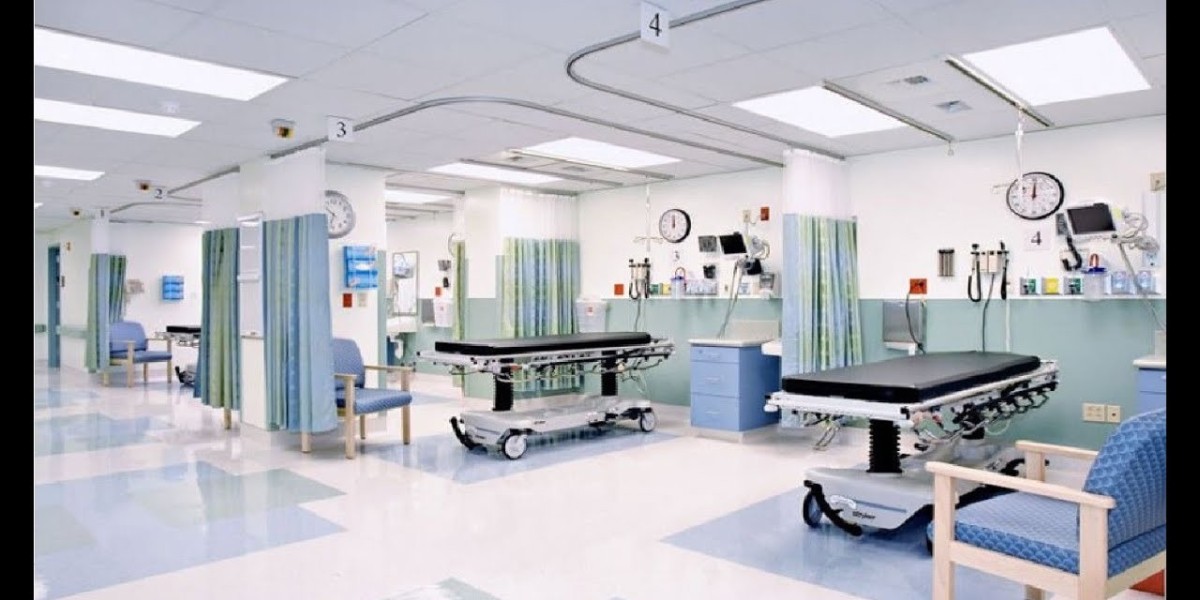In today’s fast-paced world, the need for accessible, reliable, and efficient healthcare is more critical than ever. Whether it’s a sudden injury, illness, or a medical concern that can't wait, First Care Urgent Care facilities play a pivotal role in delivering timely medical care to individuals and families. Urgent care clinics bridge the gap between the traditional doctor's office and the emergency room, offering a convenient solution for non-life-threatening medical issues that require immediate attention.
Urgent care centers have become a vital part of the healthcare landscape, providing services that are often faster and more affordable than a trip to the emergency room. In this article, we will explore everything you need to know about First Care Urgent Care, including its importance, the range of services it offers, and how it fits into the broader healthcare system.
What Is Urgent Care?
Urgent care is a category of medical services designed to treat conditions that require immediate attention but are not severe enough to warrant a visit to the emergency room. These clinics are typically open seven days a week, often with extended hours, and provide a wide range of services from diagnosing common illnesses to treating minor injuries.
One of the biggest advantages of urgent care is the convenience. Unlike primary care physicians, which often require an appointment, urgent care clinics usually accept walk-in patients. This makes it easier for individuals who need immediate care but do not have the time or opportunity to schedule a visit with their regular doctor.
Why Choose First Care Urgent Care?
1. Immediate Access to Care
Perhaps the most significant advantage of First Care Urgent Care is the immediate access to healthcare. Life is unpredictable, and medical issues can arise without warning. In such cases, waiting days or even weeks for a doctor’s appointment simply isn’t an option. Urgent care centers eliminate the need for long waiting periods by offering walk-in services and extended hours. This ensures that patients receive prompt attention when they need it the most.
2. Cost-Effective Solution
For many individuals, the cost of healthcare is a major concern. Emergency room visits can be expensive, especially if the condition being treated does not justify such a visit. Urgent care provides a much more affordable alternative. The average cost of an urgent care visit is significantly lower than an emergency room visit, making it an attractive option for those who are looking to save money without compromising on the quality of care.
3. Comprehensive Range of Services
First Care Urgent Care facilities offer a wide range of medical services, including:
Treatment for common illnesses (e.g., cold, flu, sinus infections)
Minor injuries (e.g., sprains, cuts, burns)
Diagnostic services (e.g., X-rays, lab tests)
Vaccinations and immunizations
Preventative care and routine health screenings
These clinics are staffed with qualified medical professionals, including physicians, nurse practitioners, and physician assistants, ensuring that patients receive high-quality care.
4. No Appointment Necessary
One of the most significant benefits of First Care Urgent Care is the ability to receive treatment without making an appointment. Walk-ins are welcome, and patients can simply visit the clinic whenever they need care. This is especially helpful for those with busy schedules or sudden medical concerns that arise outside of regular business hours.
5. Extended Hours and Weekend Availability
Traditional doctor’s offices are often only open during regular business hours, which can make it difficult for people with full-time jobs or other commitments to get the care they need. Urgent care clinics typically offer extended hours in the evenings and on weekends, providing greater flexibility for patients to receive care when it’s most convenient for them.
Conditions Treated at First Care Urgent Care
Urgent care centers are equipped to handle a wide variety of non-emergency medical issues. Some of the most common conditions treated at First Care Urgent Care include:
Respiratory Infections
Conditions like the common cold, flu, bronchitis, and sinus infections are frequently treated at urgent care clinics. Patients experiencing symptoms such as coughing, sneezing, congestion, or a sore throat can visit the clinic for an accurate diagnosis and appropriate treatment, including prescriptions for antibiotics or antiviral medications if necessary.
Minor Injuries
Urgent care centers are an excellent option for treating minor injuries, such as cuts, scrapes, sprains, and minor fractures. Most clinics are equipped with X-ray machines and other diagnostic tools to assess injuries and provide necessary treatment, including splinting, suturing, and wound care.
Allergic Reactions and Skin Conditions
Whether it’s a mild allergic reaction to food or environmental allergens, or skin conditions like rashes, hives, or eczema, urgent care clinics can provide relief. Treatment may include antihistamines, topical ointments, or other medications to alleviate symptoms and prevent further complications.
Gastrointestinal Issues
Patients experiencing stomach pain, nausea, vomiting, diarrhea, or indigestion can seek treatment at First Care Urgent Care. Gastrointestinal issues are often caused by infections, food poisoning, or other underlying conditions, and urgent care providers can diagnose the problem and recommend treatment options.
Infections
Urgent care clinics frequently treat a variety of infections, including urinary tract infections (UTIs), ear infections, and eye infections. Quick diagnosis and treatment can help prevent the infection from worsening and lead to faster recovery times.
Preventative Care and Screenings
In addition to treating illnesses and injuries, First Care Urgent Care also offers preventative care services. This includes routine health screenings, vaccinations, and physical exams. Whether it’s a flu shot or a school sports physical, patients can receive these services without having to wait for an appointment with their primary care provider.
The Role of First Care Urgent Care in the Healthcare System
Urgent care centers play a crucial role in the broader healthcare system by reducing the strain on emergency rooms and providing patients with timely access to care. Emergency rooms are designed to handle life-threatening conditions, and patients with non-emergency concerns often face long wait times and higher costs when seeking care at the ER.
By offering an alternative for non-life-threatening medical issues, First Care Urgent Care helps to divert patients away from overcrowded emergency rooms, ensuring that those who truly need emergency care can receive it in a timely manner.
Moreover, urgent care centers complement the services provided by primary care physicians. Many patients use urgent care clinics when they are unable to see their regular doctor, but these clinics also encourage follow-up visits with primary care providers to ensure continuity of care.
The Growing Popularity of Urgent Care Clinics
The popularity of urgent care centers has been on the rise in recent years, driven by a growing demand for accessible, affordable healthcare. Several factors contribute to this trend:
Convenience
For individuals with busy lives, the convenience of urgent care clinics is one of the main reasons they are becoming so popular. With walk-in appointments, extended hours, and shorter wait times, patients can receive care quickly and efficiently.
Cost Savings
As mentioned earlier, the cost of an urgent care visit is significantly lower than that of an emergency room visit. This makes urgent care an attractive option for individuals without insurance or those with high-deductible health plans. By providing affordable healthcare services, First Care Urgent Care helps to make healthcare more accessible to a broader population.
Quality of Care
Despite the lower costs, the quality of care at urgent care clinics is often comparable to that of traditional healthcare facilities. Urgent care centers are staffed with experienced medical professionals who are capable of diagnosing and treating a wide range of conditions. Patients can trust that they will receive appropriate care, regardless of the issue they are facing.
Filling Gaps in Healthcare Access
In many areas, especially rural or underserved communities, access to primary care can be limited. First Care Urgent Care clinics help to fill this gap by providing essential medical services to individuals who might otherwise struggle to find care. This has made urgent care an invaluable resource in ensuring that more people have access to the healthcare they need.
When to Visit Urgent Care vs. the Emergency Room
Knowing when to visit First Care Urgent Care versus the emergency room is essential for receiving the appropriate level of care. Urgent care is ideal for non-life-threatening conditions that require immediate attention, but more serious issues should still be handled by emergency medical professionals.
When to Visit Urgent Care:
Cold, flu, or respiratory infections
Minor injuries, sprains, or fractures
Allergic reactions (non-life-threatening)
Stomach pain or gastrointestinal issues
Infections (UTIs, ear infections, etc.)
Mild asthma attacks
Skin rashes or infections
Minor cuts or burns
When to Visit the Emergency Room:
Chest pain or signs of a heart attack
Stroke symptoms (sudden weakness, slurred speech)
Difficulty breathing or severe asthma attacks
Major trauma or injury (e.g., car accident)
Severe allergic reactions (anaphylaxis)
Uncontrolled bleeding
Sudden or severe abdominal pain
Loss of consciousness
Understanding the difference between urgent and emergency care can save time and money, while ensuring that patients receive the most appropriate treatment for their condition.
Conclusion
First Care Urgent Care is an essential component of the modern healthcare system, providing immediate, affordable, and high-quality care for a wide range of medical issues. With its convenience, cost savings, and comprehensive services, it serves as a vital resource for individuals seeking timely healthcare without the need for an emergency room visit.
For more information about urgent care services and to find a clinic near you, visit First Care Clinics4u. Whether you need treatment for a minor injury, a respiratory infection, or a routine check-up, First Care Urgent Care is there to provide the care you need, when you need it.






